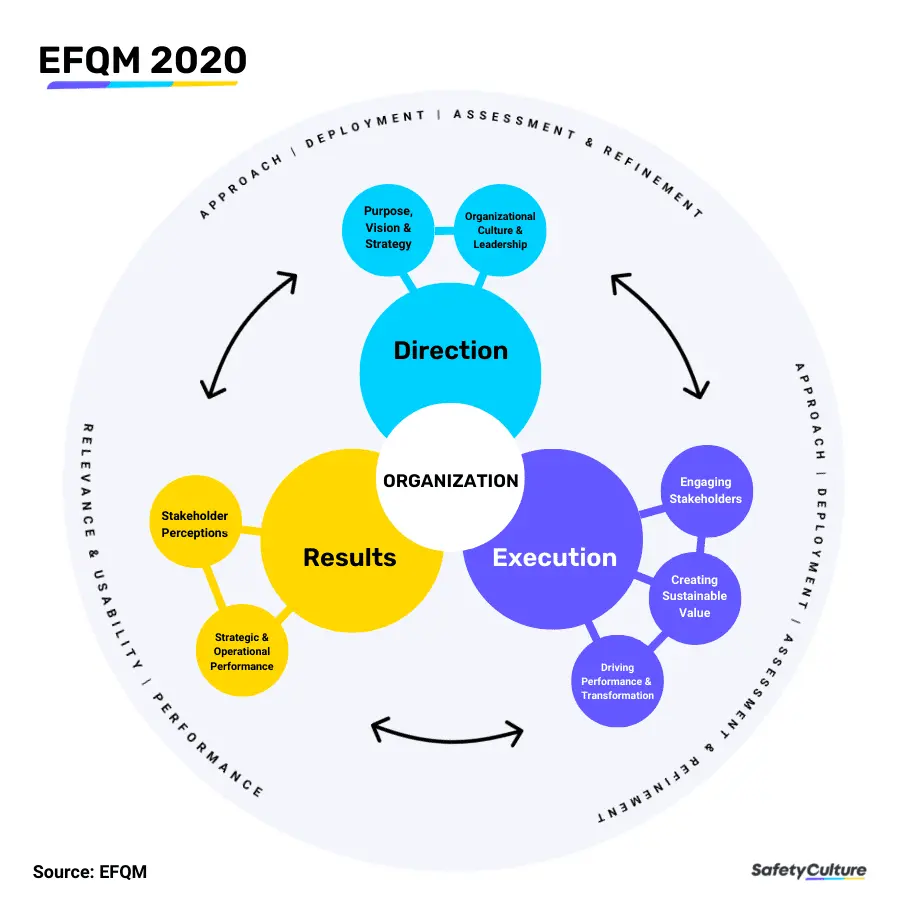What is the EFQM Excellence Model?
EFQM, also known as the European Foundation for Quality Management business excellence model, is a globally recognized framework that companies can use to assess their performance and identify areas for continuous improvement. The quality management model is based on the premise that organizations must continuously strive for sustainable excellence to succeed and have a competitive advantage. To this end, the model provides a structured approach for assessing an organization’s performance and is based on asking these three questions:
- Direction: Why does this organization exist? What purpose does it fulfill? Why this particular strategy?
- Execution: How does it intend to deliver on its purpose and strategy?
- Results: What has it actually achieved to date? What does it intend to achieve tomorrow?

These serve as the EFQM‘s primary driving factor, and two or three sub-criteria are associated with each section that helps flesh out the assessment. These criteria provide a comprehensive overview of an organization’s performance when used together.
Direction
- Purpose, Vision, and Strategy – These criteria help assess an organization’s overall direction and purpose. It looks at whether the organization has a clear sense of why it exists, what it aims to accomplish, and how it intends to do so.
- Organizational Culture and Leadership – These criteria help assess an organization’s culture and leadership. It looks at whether the organization has a positive and supportive culture that encourages innovation and creativity. It also looks at whether the organization’s leaders effectively provide direction and inspire others to achieve excellence.
Execution
- Engaging Stakeholders – This criterion looks at whether the business effectively engages its stakeholders. It assesses whether the organization clearly understands its stakeholders’ needs and whether it can effectively communicate with them.
- Creating Sustainable Value – This criterion looks at whether the organization is creating sustainable value. It assesses whether the business is effectively managing its resources and whether it is generating long-term value for its stakeholders.
- Driving Performance & Transformation – This criterion looks at whether the business effectively drives performance and transformation. It assesses whether the organization has a clear understanding of its strengths and weaknesses and whether it is effectively leveraging these to drive improvements.
Results
- Stakeholder Perceptions – This criterion looks at whether the business is meeting or exceeding the expectations of its stakeholders. It assesses whether the organization is delivering on its promises and whether it is creating value for its stakeholders.
- Strategic & Operational Performance – This criterion looks at whether the business is achieving its strategic and operational goals. It assesses whether the organization effectively executes its strategy and achieves its desired results.
Benefits
The EFQM Model is for you if you want to establish and provide leaders at all levels with a sense of purpose and create a culture that is dedicated to performance improvement while remaining agile, adaptable, and future-proof. Moreover, here’s how EFQM can help your organization:
It Helps Define Your Purpose
The lifeblood of any organization is its purpose. There’s no reason to serve unless there’s a purpose. The EFQM Model emphasizes organizations’ need for purpose, vision, and agile tactics to create long-term value.
It Helps Create Your Culture
The EFQM Model is a cultural innovator that emphasizes fundamental quality principles and shared objectives at the heart of businesses while still allowing them to be connected and committed to their mission.
It Helps Forge Strong Leaders
Authentic leadership keeps an organization true to its purpose and vision. The EFQM Model recommends a ‘leaders at every level’ strategy for ensuring sound decision-making, collaboration, and synergy in all teams and projects.
It Helps Transform Your Organization
The EFQM Model provides a tried and tested framework to make implementing change as quick and painless as possible.
It Helps Address Unique Organizational Challenges
All organizations are unique; therefore, no one approach to transformation works for everyone. Rather than being based on a single model, EFQM was built to adapt to specific organizational challenges while improving performance.
It Helps Foster Agile Practices
It is a characteristic of an effective firm to be nimble as new threats emerge. The EFQM Model enables you to chart a safe route toward progress and change by providing structural analysis and insight into your organization.
It Helps Forecast the Future
The EFQM Model was created after years of observing market changes and understanding the advantages of organizational analysis, future prediction, and predictive intelligence in achieving genuine transformation.
Create Your Own EFQM Audit Checklist
Eliminate manual tasks and streamline your operations.
Get started for FREEWhat are the Limitations of the EFQM Model?
There are several limitations to the EFQM Model that should be considered before implementing it:
- It is not a miracle solution and won’t solve all your organization’s problems.
- It is only as effective as the data you input into it.
- It can be time-consuming to collect the data required for an accurate assessment.
Nonetheless, the EFQM Model remains a popular and widely-used framework for organizational improvement.
Certification Award
An EFQM certification award recognizes organizations that have outstanding performance levels with the EFQM Excellence Model. To be eligible, organizations must first complete a rigorous self-assessment process and then undergo an independent assessment by a panel of experts. It is widely thought to be one of the most stringent and credible awards in Europe. There are four key EFQM recognition categories:
Validated by EFQM
The first level of certification, labeled ‘Validated by EFQM,’ is intended for businesses that have just begun to use the EFQM Model. You can publicly demonstrate your commitment to continuous improvement to your key stakeholders once EFQM has validated you. It is valid for three years.
Qualified by EFQM
‘Qualified by EFQM’ goes into more detail than ‘Validated by EFQM.’ You may publicly demonstrate your commitment to continuous improvement in internal and external communications once you’ve completed EFQM’s Qualification program. It is valid for three years.
Recognized by EFQM
The ‘Recognized by EFQM’ certification is a comprehensive management evaluation of your business, according to the EFQM Model. It analyzes your performance against your goals and difficulties as a whole. Your organization will be rated 3-7 stars depending on its overall score after you’ve been ‘Recognised by EFQM.’ It is valid for three years.
EFQM Global Award
The ‘EFQM Global Award’ is an international award that rewards excellence in organizations of all kinds, both public and private. It recognizes organizations with a proven track record of converting ideas into action and continuous performance improvement.
Independent EFQM Assessors conduct the evaluation. They assess critical performance using the model and provide customized recommendations throughout the process, according to EFQM standards.
How Do I Apply EFQM in My Business?
The EFQM framework may be applied in business using assessment matrices and diagnostic tools, such as the RADAR, to self-assess against the EFQM model. There are presently three matrices available for all business levels to utilize:
- EFQM ‘Foundation Level’ Questionnaire – This is a simple questionnaire to help businesses determine where they are currently and what areas they might improve.
- Business Matrix Assessment Tool – This module assesses the company against all elements of the EFQM Model and assigns a score to each RADAR element. Businesses may take advantage of this tool to gain deeper insight into their performance.
- Business Matrix Advanced Assessment Tool – This tool takes the data from all criteria of the EFQM Model and associated guidance points and computes a total RADAR score. Using this approach, organizations may look at their performance and discover where they currently excel and need to improve.




